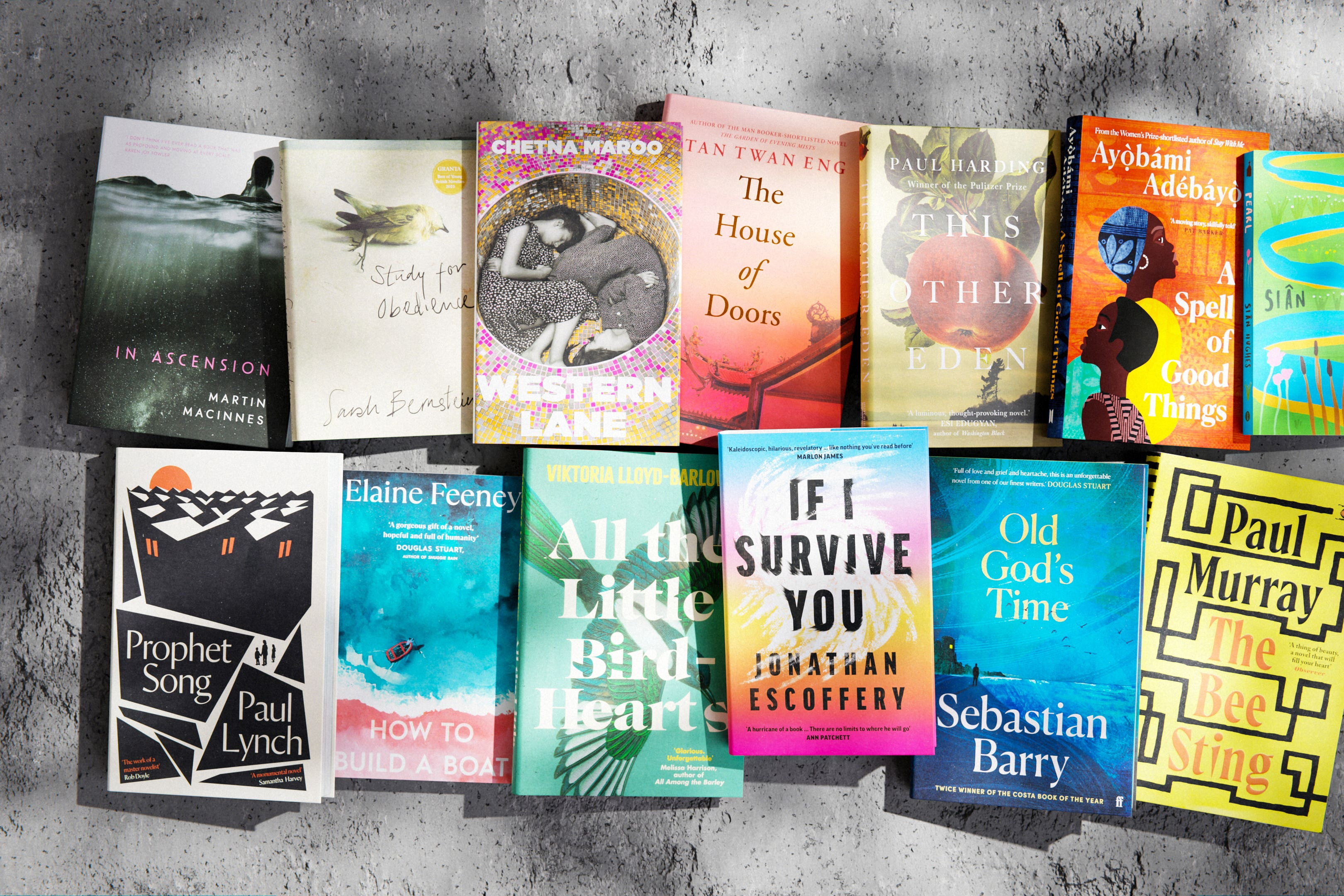The 2024 Booker Prize shortlist was announced at Somerset House on Monday (16 September), with religion, climate change, and race among the key themes tackled by the selected titles. Judges had the arduous task of whittling down the 13 longlisted books, announced in July, to just six, and broke records in the process.
The prestigious literary award’s 2024 shortlist features the largest number of women in its 55-year history, with five women and one man represented. Each of the six shortlisted authors receives a £2,500 prize and a bespoke bound edition of their book. They are also likely to enjoy a significant uptick in sales owing to the vast publicity surrounding the Booker Prize.
Common themes among this year’s selected titles are those which transport readers around the world, out of the Earth’s atmosphere, and across time. Announcing the news at Somerset House, Edmund de Waal, chair of the 2024 judges, insisted that the books were not selected for the “issues” they tackled, though he did acknowledge that they all grappled with ideas of identity and the “fault lines of our times”.
The list features mostly established writers, with only one debut author making an appearance. It’s a distinct change from the 2023 shortlist in which only debut authors were selected, including last year’s winner Paul Lynch, who won for his book Prophet Song.
There is one British author on this year’s list, Samantha Harvey. Australian, Dutch, American, and Canadian writers also appear. The winner of the 2024 Booker Prize will be announced on Tuesday 12 November, and will be awarded £50,000 in prize money.
The Shortlist
Here are the six books that have been shortlisted for the 2024 Booker Prize:
James by Percival Everett (Mantel)
A re-telling of Mark Twain’s masterpiece Huckleberry Finn, Everett’s novel follows the experience of Finn’s companion James, a runaway slave. The author has said that he does not see his work as a corrective to the original, but rather as in “conversation” with Twain.
This is the second time that Everett has been nominated for the Booker, the first being for his novel The Trees in 2022. The American author’s 2001 novel Erasure was adapted into Oscar-nominated film, American Fiction starring Jeffrey Wright in 2023.
Orbital by Samantha Harvey (Jonathan Cape)
Six astronauts rotate around the earth on the International Space Station in Orbital. Their minds wander to existential questions about life, earth, and relationships as they share intimate conversations with one other. Speaking about her novel, Harvey said she attempted to write from a place of realism rather than sci-fi and attempted to do so with “the care of a nature writer”.
Like Everett, this is the second time that the British author has been longlisted for the Booker, the first being in 2009 for The Wilderness. It is the first time she has been shortlisted.
Creation Lake by Rachel Kushner (Jonathan Cape)
Set amid the chaos of the climate crisis, Kushner’s novel follows protagonist Sadie Smith in her work as an undercover agent on a mission to infiltrate a commune of eco-activists in rural France led by a charismatic leader. Tensions arise when she finds herself falling under his spell.
The American author has been nominated for the Booker once before in 2018 with The Mars Room. She is an internationally bestselling author whose work has been translated into 27 languages. Speaking about Creation Lake, Kushner said that she had long wanted to write a novel about a group of people “on a collision course with the French state”.
Held by Anne Michaels (Bloomsbury Publishing)
The acclaimed Canadian author’s third book spans four generations, and revisits themes covered in her earlier work, including history, loss, trauma, and love. In Held, a carousel of characters appear including John who returns home from war grievously wounded; Alan, a war photographer, and Mara, a nurse in a field hospital. Their sense of the present is interrupted by memories of the past as Michaels does away with traditional narrative structures.
Speaking about the themes of her book, she said she had been moved by the voices that were needed “in these urgent times”. The author has won several awards in the past, including the Orange Prize for Fiction, and her books have been translated into more than 50 languages.
The Safekeep by Yael van der Wouden (Viking)
A tale about desire and infatuation, The Safekeep tells the story of two very different women who find themselves living together when Isabel’s brother drops his irreverent and chaotic girlfriend off at his sister’s house. Set in the aftermath of the Second World War, a rage-fuelled obsession ensues as Isabel desperately grasps for order.
The Dutch author is the only debut writer on the list. Van der Wouden said the book was inspired by a short story she once wrote about “three siblings out for dinner and the additional girlfriend everyone hates”.
Stoneyard Devotional by Charlotte Wood (Sceptre)
A middle-aged woman returns to Sydney in need of rest and retreat. An atheist, she surprisingly finds herself embedded within a religious community whose sleepy existence is disturbed by three mysterious events.
Wood is an Australian author whose oeuvre includes seven novels and three works of nonfiction. She said that Stoneyard Devotional “grew from elements of my own life and childhood merging with an entirely invented story about an enclosed religious community”.
A Conversation with the Judges
The 2024 judging panel is chaired by artist and author Edmund de Waal, who is joined by novelist Sara Collins; Guardian fiction editor Justine Jordan; writer Yiyun Li; and composer Nitin Sawhney. The judges will now read the shortlisted works for a third time and the winner of the £50,000 prize will be revealed at a ceremony in London on November 12th.
Edmund de Waal said: “We have spent months sifting, challenging, questioning – stopped in our tracks by the power of the contemporary fiction that we have been privileged to read. And here are the books that we need you to read. Great novels can change the reader. They face up to truths and face you in their turn.
“If that sounds excessive it reflects the urgency that animates these novels. Here is storytelling in which people confront the world in all its instability and complexity. The fault lines of our times are here. Borders and time zones and generations are crossed and explored, conflicts of identity, race and sexuality are brought into renewed focus through memorable voices. The people who come alive here are damaged in ways that we come to know and respect, and we come to care passionately about their histories and relationships.
“My copies of these novels are dog-eared, scribbled in. They have been carried everywhere – surely the necessary measure of a seriously good novel. Our final meeting to choose this shortlist together was punctuated by delight at them. They are books that made us want to keep on reading, to ring up friends and tell them about them.
“We’re not bloody academics,” he said, insisting that a prize-winning novel has to impress on both a first reading and a third. “The book has to work on that immediate cellular level and then it absolutely has to endure, have the longevity of proper literature.”
The Authors on Their Books
The author said: “Mark Twain’s The Adventures of Huckleberry Finn is the source of my novel. I hope that I have written the novel that Twain did not and also could not have written. I do not view the work as a corrective, but rather I see myself in conversation with Twain.”
The judges said: “This is a book that subverts all expectations, as well as further establishing its author as a masterful storyteller. The narrative experimentation challenges traditional genre conventions. It’s a book that compels us to question, and reflect on, the nature of morality, the corrupting influence of power and the resilience of the human spirit. Its universal themes of identity, freedom and justice will resonate with contemporary readers, despite the book presenting initially as the retelling of a classic novel.”
The author said: “I wanted to write about our human occupation of low Earth orbit for the last quarter of a century – not as sci-fi but as realism. Could I evoke the beauty of that vantage point with the care of a nature writer? Could I write about amazement? Could I pull off a sort of space pastoral? These were the challenges I set myself.”
The judges said: “It blurs the distinctions between borders, time zones and our own individual stories, provides a vantage point we haven’t encountered in fiction before, and is infused with such awe and reverence that it reads like a love letter, an act of worship. A brief yet miraculously expansive novel, it offers us a vision of our planet as borderless and interlinked, and makes the case for co-operation and respect for our shared humanity.”
The author said: “I had long wanted to tell a story about a group of young people who decamp from Paris to a rural outpost in France, where they are set on a collision course with the French state. At the same time, I became interested in prehistory, both what can be known about ancient people and what the longing to know actually is, a sense that we have taken a wrong turn, that our ancestors hid messages from us that we don’t know how to read.”
The judges said: “Novels that investigate what it is to be human can veer into the sentimental; this one is utterly flinty and hard-nosed. It’s quite something to wrap a novel of ideas into a page-turning spy thriller, and to achieve a narrative voice that is so audaciously confident – and then subtly undercut it. There’s also mystery at the book’s core – both the mystery of human origins and of individual identity. The author’s prose is juicy, her narrator jaunty, her worldbuilding lush, and she also taps into something profound.”
The author said: “Every day writing this book I asked myself: in these urgent times, what voice might be small enough to be heard; what do we need now? We measure history by events and actions, but this book wants to assert a different measure for history, the real and powerful effect of our inner lives – what we believe, what we value, what we love, what we aspire to.”
The judges said: “We loved the quietness of this book, and surrendered to it. Its large themes are of the instability of the past and memory, but it works on a cellular level due to the astonishing beauty of its details. There are very few books that can achieve a pitch of poetic intensity sustained across a whole novel. Starting with a wounded soldier on a French battlefield, this lyrical kaleidoscope of a novel is created from the scattered images and memories of four generations of a family.”
The author said: [The book was inspired by] ‘A short story I once wrote about three siblings out for dinner and the additional girlfriend everyone hates; a fascination with how the Dutch narrativise national histories; wanting to explore desire as the flipside of repulsion. The way it happened was like this: I was on the way back from a funeral, looking out over flat Dutch fields, and somewhere between grief and a need to escape the idea bloomed, of a house, a woman and a stranger.’
The judges said: ‘This is a compelling and atmospheric story of obsession and secrets. It’s a novel that explores the things that are kept from us as children, and the things we tell ourselves about our own hidden desires. A quietly devastating queer love story which reveals itself to be a story of the Holocaust, it shows how alternate truths are held in fissile connection, something that is relevant to today’s world.’
The author said: ‘Stone Yard Devotional grew from elements of my own life and childhood merging with an entirely invented story about an enclosed religious community. Writing it during pandemic lockdowns, followed by a serious illness – and the way these twin upheavals demolished so many of our consoling certainties – gave me an urgent instinct to shed anything inessential in my work. I wanted nothing trivial, nothing insincere in this book.’
The judges said: “A fierce and philosophical interrogation of history, memory, nature, and human existence. It is set in a claustrophobic environment and reveals the vastness of the human mind: the juxtaposition is so artfully done that a reader feels trusted by the author to be an intellectual partner. It chronicles one woman’s inward journey to make sense of the world – and her life – when conflicts and chaos are abundant in both realms.”
The 2024 Booker Prize winner will be announced on November 12th.

















